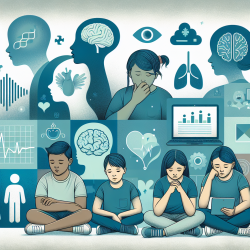Introduction
In the realm of speech-language pathology, particularly when working with children, the integration of innovative, evidence-based interventions is crucial. One such intervention that has garnered attention is music therapy, which has been extensively studied for its impact on dementia. While the primary focus of these studies is on dementia, the underlying principles and findings can be extrapolated to inform practices in speech-language pathology, especially in online therapy settings such as those provided by TinyEYE.
Understanding the Research
The research article titled "Impacts of Music Intervention on Dementia: A Review Using Meta-Narrative Method and Agenda for Future Research" provides a comprehensive review of the effects of music on dementia symptoms. The study highlights music as a safe, cost-effective non-pharmacological approach, although it notes variability in outcomes due to factors such as music selection and intervention protocols. The study emphasizes the need for personalized music interventions tailored to individual needs and preferences, which is a principle that can be effectively applied in speech-language pathology.
Application in Speech-Language Pathology
For practitioners in speech-language pathology, especially those providing online therapy, integrating music interventions can be a powerful tool. Here are some ways to implement these findings:
- Personalization: Just as in dementia care, selecting music that resonates with the child’s preferences can enhance engagement and communication. Consider involving parents or caregivers in selecting music that the child enjoys.
- Active Participation: Encourage children to actively participate in music activities, such as singing or playing simple instruments. This can aid in developing speech and language skills through rhythm and melody.
- Routine Integration: Incorporate music into regular therapy sessions to create a structured yet dynamic environment that can help improve focus and reduce anxiety.
Encouraging Further Research
The research identifies several gaps that require further exploration, such as the long-term effects of music interventions and their impact on different stages of cognitive decline. For speech-language pathologists, contributing to this body of research by documenting and sharing outcomes from music-integrated therapy sessions can provide valuable insights and help refine intervention strategies.
Conclusion
Music interventions offer a promising avenue for enhancing therapy outcomes in speech-language pathology. By applying the principles from dementia research, practitioners can create engaging, effective therapy sessions that cater to the unique needs of each child. As we continue to explore the potential of music in therapeutic settings, ongoing research and collaboration will be key to unlocking its full benefits.
To read the original research paper, please follow this link: Impacts of Music Intervention on Dementia: A Review Using Meta-Narrative Method and Agenda for Future Research.










